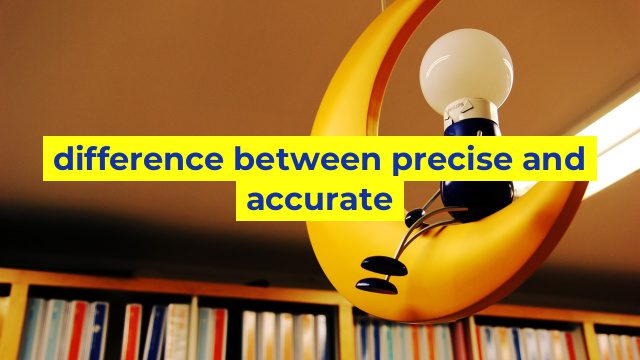The Difference Between Precise and Accurate: What You Need to Know
When it comes to language, precision and accuracy are two attributes that are often confused or interchanged. Although these terms may seem similar, there is a clear distinction between them that can have an impact on the way we communicate and interpret information. In this article, we will explore the difference between precise and accurate and why understanding this difference can be important.
What Does Precise Mean?
Precise refers to the level of detail or exactness in a particular measurement or description. Something can be considered precise if it contains a lot of information and the information is presented in a clear and concise manner. When we describe something as precise, we are emphasizing the quality of its details.
For example, if a person is asked to describe the color of a shirt, they may say that it is “light blue.” This description is imprecise because it does not provide a lot of information. On the other hand, if the person were to say that the shirt is “a light turquoise color with a faint yellowish undertone,” the description is more precise because it provides more information and detail.
What Does Accurate Mean?
Accuracy, on the other hand, refers to the level of truthfulness or correctness of a statement, measurement, or description. Something can be considered accurate if it is free from errors or mistakes, and it presents a true reflection of reality. When we describe something as accurate, we are emphasizing the quality of its correctness.
For instance, if a person weighs themselves on a scale and the scale displays a weight of 140 pounds, the weight is accurate if it is an actual reflection of the person’s weight. However, if the scale is broken or faulty and displays a weight of 135 pounds, this weight might not be accurate, even if it is precise.
Why Is the Difference Important?
Understanding the difference between precise and accurate is critical, especially in fields where there is a need for accurate measurements, data, and information. In science, engineering, and medicine, for example, precise measurements of chemicals, temperature, or time can have a significant impact on the results of experiments or tests. In such cases, using imprecise measurements may lead to the wrong conclusions or inaccurate results.
Similarly, in communication or writing, understanding the difference between precise and accurate can help you express your thoughts and ideas better. Choosing precise words can help you convey your message more effectively, while choosing accurate words can help you avoid misunderstandings or incorrect interpretations.
In conclusion, while precision and accuracy are often used interchangeably, they hold different meanings and are important in different fields. Precision refers to the level of detail and exactness in a measurement, while accuracy refers to the level of truthfulness or correctness of a statement or description. Emphasizing precision is crucial when there is a need for clear and concise information, while emphasizing accuracy is crucial when there is a need for correct and truthful information.
Table difference between precise and accurate
| Term | Description | Example |
|---|---|---|
| Precise | A measurement or value that is close to the true or expected value, with very little variation or error. | A stopwatch that measures to the nearest hundredth of a second and consistently records times within a fraction of a second of each other. |
| Accurate | A measurement or value that is true or correct, with no errors or mistakes. | A scale that correctly weighs an object and displays the exact weight, with no rounding or approximation. |


